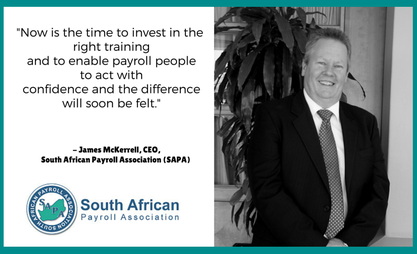 To reap the benefits of employee satisfaction, productivity and profit, South Africa should adopt global practices when it comes to the function of payroll in businesses. While payroll professionals are internationally recognised as valuable contributors to management, strategy and finance, often sitting on the board of large companies, this is unfortunately not the case in South Africa. “The South African organisation needs to break old habits and look to new ways of redefining payroll,” says James McKerrell, CEO, South African Payroll Association. “Stop relying heavily on technology or simply appointing a data capturer to work the system, neither of these solutions can provide the business with the insight and support it really needs. Internationally, payroll is more proactive, advising employees on how to structure their pay packages for greater benefit and liaising with management in terms of overtime spend, staffing and productivity targets.” This means that payroll departments in companies abroad has inordinate value and businesses are benefitting in terms of bottom line and employee morale. Save or spend “In the UK organisations typically use two people to do the job of payroll, which has the additional benefits of no burnout, no overwork and a work-life balance,” says McKerrell. “In SA, there remain historical skill gaps and dissimilarities in work ethic steeped in cultural differences. The result is that technology, an excellent resource with impressive functionality in SA, is picking up the slack. However, technology can’t advise on roles, employment numbers and employee benefits and cannot solve all payroll problems.” Therefore, if the local business sector rethinks its model and invest in the role of payroll, despite it being 1.5 times higher than current salaries, they will undoubtedly experience significant overall savings. “Internationally, payroll professionals are not as busy and they have more time for manual processes,” adds McKerrell. “In South Africa, they are overworked. This is where technology can now step in, doing the transactional elements while allowing for the payroll professional to take on a more strategic and advisory role.” Planning ahead The steps towards an inclusive and dynamic payroll role is to blend technology with humanity, allowing for the former to support the latter rather than take on the role in its entirety. “Payroll, when integrated and not overworked, will deliver insight, strategy and a more holistic view of the business,” concludes McKerrell. “Internationally payroll training has followed this model for years, South Africa is only just getting started. Now is the time to invest in the right training and to enable payroll people to act with confidence and the difference will soon be felt.” ENDS MEDIA CONTACT: Idéle Prinsloo, 082 573 9219, [email protected], www.atthatpoint.co.za For more information on SAPA please visit: Website: http://www.sapayroll.co.za/ Twitter: @SAPayroll LinkedIn: The South African Payroll Association
0 Comments
 Payroll data is often overlooked in keeping a business financially aware during difficult economic times. “Not only can the data gleaned from payroll functionalities allow for the business to streamline costs, but it can provide significant control over planning, accounting and management,” says James McKerrell, chairman of the South African Payroll Association (SAPA). According to McKerrell, the payroll function manages a large portion of the most valuable information inside the organisation – data. The data allows the business owner to understand trends and make strategic decisions based on the costs of employees and their roles within the organisation. Employee morale boosted By analysing payroll data effectively, business owners can determine trends in employee costs such as with standby, overtime and shift allowances. Payroll data and comparative reporting against productivity and historical data lets the business owner potentially establish how a particular overtime cost could balance the cost of hiring new employees. “This then has the knock-on effect of leading to improved productivity as employees who constantly work overtime are often tired and stressed which leads to lower performance, work quality and morale,” says McKerrell. Employee costs kept to a minimum Payroll data can also show whether hiring a freelance or contractor would either increase or reduce costs. Often contract or freelance employees are more expensive than permanent employees. However, if the business requires once-off or short term support for additional skills on a project basis, this data can reveal how costly it is and allow for the organisation to factor these overheads into their quotations or projects. “When management gets sight of this information in a real-time environment, strategic decisions can be implemented far more effectively,” advises McKerrell. Payroll data adds value to the business in the form of better productivity, improved cost control and long-term financial management. These are valuable boxes to tick, especially when they also potentially allow for improved employee wellbeing and morale over the long term. ENDS MEDIA CONTACT: Juanita Vorster, 079 523 8374, [email protected], www.atthatpoint.co.za For more information on SAPA please visit: Website: www.sapayroll.co.za Twitter: @SAPayroll LinkedIn: The South African Payroll Association |
Welcome to the South African Payroll Association newsroom.
Archives
July 2020
Categories
All
|

 RSS Feed
RSS Feed